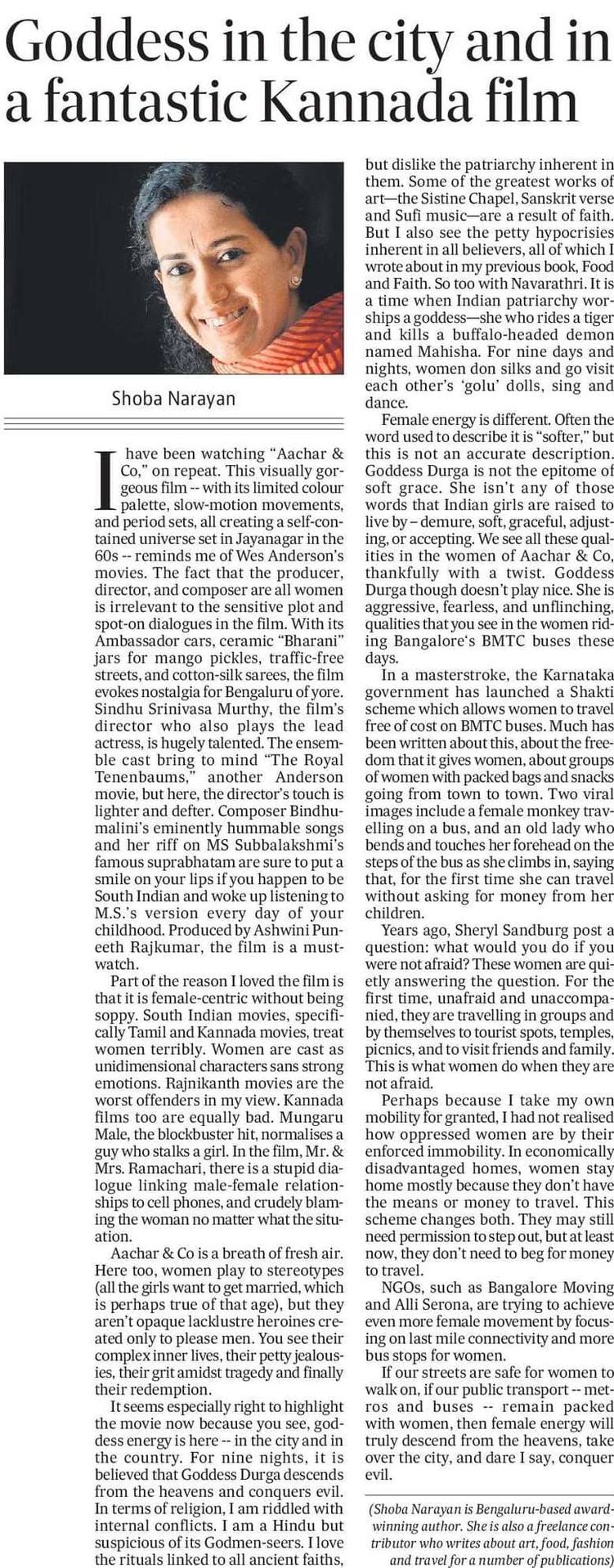I have been watching “Aachar & Co,” on repeat. This visually gorgeous film– with its limited colour palette, slow-motion movements, and period sets, all creating a self-contained universe set in Jayanagar in the 60s– reminds me of Wes Anderson’s movies. The fact that the producer, director, and composer are all women is irrelevant to the sensitive plot and spot-on dialogues in the film. With its Ambassador cars, ceramic “Bharani” jars for mango pickles, traffic-free streets, and cotton-silk sarees, the film evokes nostalgia for Bangalore of yore. Sindhu Srinivasa Murthy, the film’s director who also plays the lead actress, is hugely talented. The ensemble cast bring to mind “The Royal Tenenbaums,” another Anderson movie, but here, the director’s touch is lighter and defter. Composer Bindhumalini’s eminently hummable songs and her riff on M.S. Subbalakshmi’s famous suprabhatam are sure to put a smile on your lips if you happen to be South Indian and woke up listening to M.S.’s version every day of your childhood. Produced by Ashwini Puneeth Rajkumar, the film is a must-watch.
Part of the reason I loved the film is that it is female-centric without being soppy. South Indian movies, specifically Tamil and Kannada movies treat women terribly. Women are cast as unidimensional characters sans strong emotions. Rajnikanth movies are the worst offenders in my view. Kannada films too are equally bad. Mungaru Male, the blockbuster hit, normalises a guy who stalks a girl. In the film, Mr. & Mrs. Ramachari, there is a stupid dialogue linking male-female relationships to cell phones, and crudely blaming the woman no matter what the situation.
Aachar & Co is a breath of fresh air. Here too, women play to stereotype (all the girls want to get married, which is perhaps true of that age), but they aren’t opaque lacklustre heroines created only to please men. You see their complex inner lives, their petty jealousies, their grit amidst tragedy and finally their redemption.
It seems especially right to highlight the movie now because you see, goddess energy is here– in the city and in the country. For nine nights, it is believed that Goddess Durga descends from the heavens and conquers evil. In terms of religion, I am riddled with internal conflicts. I am a Hindu but suspicious of its Godmen-seers. I love the rituals linked to all ancient faiths, but dislike the patriarchy inherent in them. Some of the greatest works of art—the Sistine Chapel, Sanskrit verse and Sufi music—are a result of faith. But I also see the petty hypocrisies inherent in all believers, all of which I wrote about in my previous book, Food and Faith. So too with Navarathri. It is a time when Indian patriarchy worships a goddess—she who rides a tiger and kills a buffalo-headed demon named Mahisha. For nine days and nights, women don silks and go visit each other’s ‘golu’ dolls, sing and dance.
Female energy is different. Often the word used to describe it is “softer,” but this is not an accurate description. Goddess Durga is not the epitome of soft grace. She isn’t any of those words that Indian girls are raised to live by – demure, soft, graceful, adjusting, or accepting. We see all this qualities in the women of Aachar & Co, thankfully with a twist. Goddess Durga though doesn’t play nice. She is aggressive, fearless, and unflinching, qualities that you see in the women riding Bangalore‘s BMTC buses these days.
In a masterstroke, the Karnataka government has launched a Shakti scheme which allows women to travel free of cost on BMTC buses. Much has been written about this, about the freedom that it gives women, about groups of women with packed bags and snacks going from town to town. Two viral images include a female monkey traveling on a bus, and an old lady who bends and touches her forehead on the steps of the bus as she climbs in, saying that, for the first time she can travel without asking for money from her children.
Years ago, Sheryl Sandburg post a question: what would you do if you were not afraid? These women are quietly answering the question. For the first time, unafraid and unaccompanied, they are travelling in groups and by themselves to tourist spots, temples, picnics, and to visit friends and family. This is what women do when they are not afraid.
Perhaps because I take my own mobility for granted, I had not realized how oppressed women are by their enforced immobility. In economically disadvantaged homes, women stay home mostly because they don’t have the means or money to travel. This scheme changes both. They may still need permission to step out, but at least now, they don’t need to beg for money to travel.
NGOs, such as Bangalore Moving and Alli Serona are trying to achieve even more female movement by focusing on last mile connectivity and more bus stops for women.
If our streets are safe for women to walk on, if our public transport– metros and buses remain packed with women, then female energy will truly descend from the heavens, take over the city, and dare I say, conquer evil.
Shoba Narayan is Bangalore-based award-winning author. She is also a freelance contributor who writes about art, food, fashion and travel for a number of publications.



-k4lD-U204025897261YmH-250x250%40HT-Web.jpg)



Leave A Comment